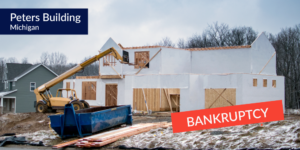
On February 18, 2021, five contractors filed an involuntary Chapter 7 bankruptcy petition against Peters Building Company of Saline, Michigan.
Involuntary bankruptcy is a rare legal procedure that creditors take to force the debtor into bankruptcy. Often in cases of involuntary bankruptcy, the debtor has enough funds to pay its debts, but has decided not to pay them. Creditors can file involuntary bankruptcy only under Chapter 7 or 11. If the debtor has 12 or more creditors, the law requires that three or more of those creditors file the bankruptcy petition.
According to the petition, Peters owes Multi Drywall & Partition, Chelsea Lumber Company, Quality Roofing Inc., Lanawee Construction Consultants, and J&K Outdoor Services a total of $3,380,840.06.
Peters Building Company faces multiple lawsuits and liens
The debtor in this case, Peters Building Company, was founded in 1971, and has completed several residential and commercial projects in Washtenaw County, Michigan.
“We deliver our product on time, and if we say we’ll do it, we’ll do it,” James Haeussler, the company’s president, states on Peters’ website.
However, the developer allegedly leaves behind a trail of unfinished projects and unpaid contractors.
In July 2020, Acoustic Ceiling & Partition Company sued Peters and Haeussler for $156,624.93 worth of unpaid construction work on a Best Western Premier hotel in Saline. According to the Saline Post, the project has been stalled since early 2020 for unknown reasons.
The lawsuit lists six other organizations who have liens on the unfinished hotel property, including Chelsea Lumber Company and Quality Roofing, two of the claimants in the bankruptcy petition. AAA Portable Toilets, Hoffman Plastering, First State Bank, and Tri County Electric also have liens against the property. According to the lawsuit, Acoustic Ceiling & Partition wants to foreclose on the hotel property and recover attorney fees.
Peters fights city hall
Peters has been on the other side of legal action as well. In 2018, the company sued the city of Ann Arbor after its city council rejected a rezoning ordinance for a residential project that Peters was developing. In November 2019, Ann Arbor City Council agreed to a compromise that allowed the project to go forward if the developer saved 13 landmark trees and 62 woodland trees on the property.
However, after City Council and Peters reached this agreement, the contentious project never got off the ground.
Thrive Collaborative, an eco-conscious development group, is now submitting its own proposals for the property, according to the MLive article.
Before his company ran into legal issues with local government and private contractors, Haeussler was a member of Michigan’s Residential Builders’ and Maintenance and Alteration Contractors’ Board from 2006 to 2010. The board licenses builders and subcontractors, sets criteria for licensure, and penalizes code violations in Michigan. The description on michigan.gov says that Haeussler was “appointed to represent licensed residential builders.”